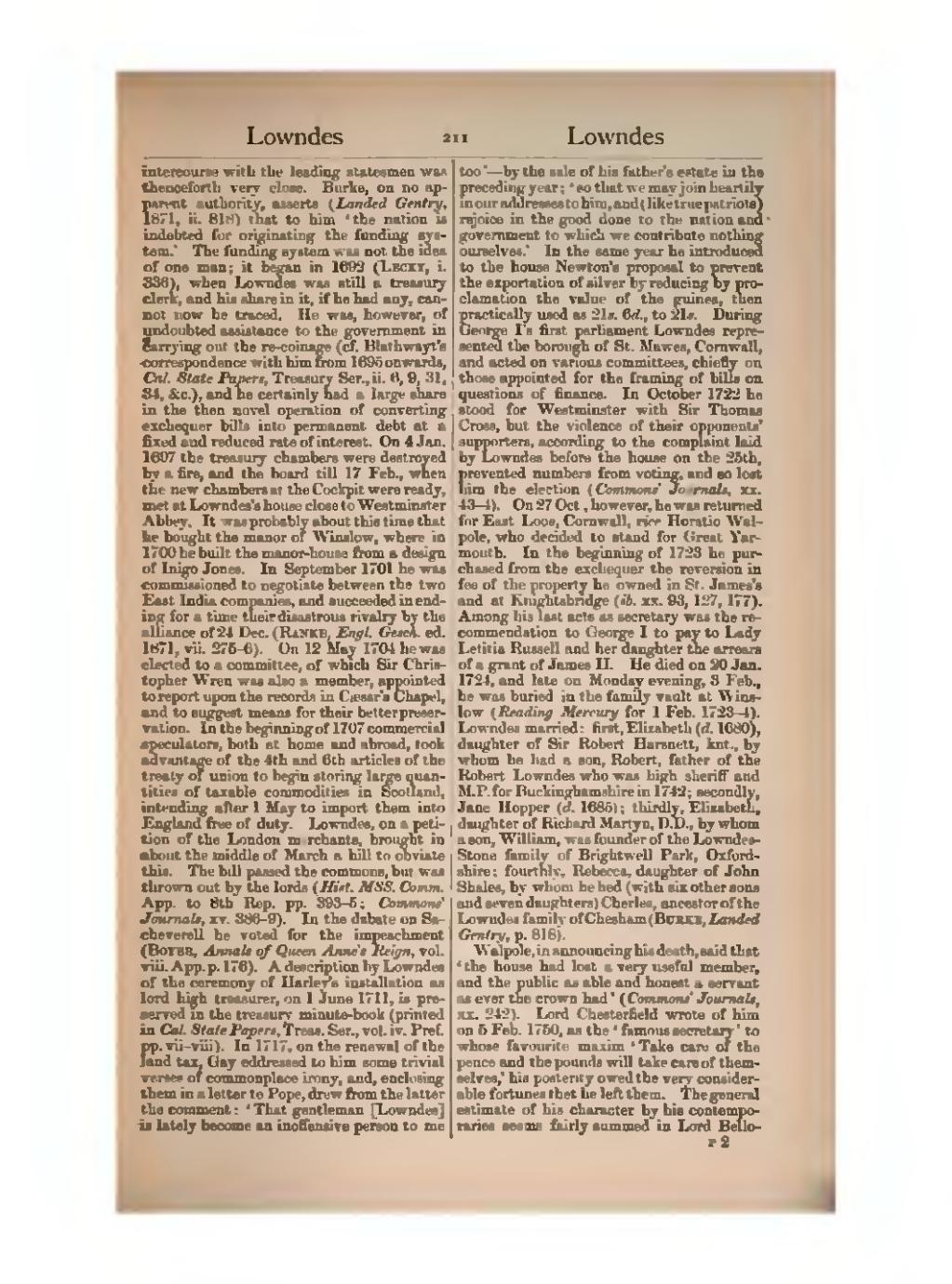intercourse with the leading statesmen was thenceforth very close. Burke, on no apparent authority, asserts (Landed Gentry, 1871, ii. 818) that to him ‘the nation is indebted for originating the funding system.’ The funding system was not the idea of one man; it began in 1692 (Lecky, i. 336), when Lowndes was still a treasury clerk, and his share in it, if he had any, cannot now be traced. He was, however, of undoubted assistance to the government in carrying out the re-coinage (cf. Blathwayt's correspondence with him from 1695 onwards, Cal. State Papers, Treasury Ser., ii. 6, 9, 31, 34, &c.), and he certainly had a large share in the then novel operation of converting exchequer bills into permanent debt at a fixed and reduced rate of interest. On 4 Jan. 1697 the treasury chambers were destroyed by a fire, and the board till 17 Feb., when the new chambers at the Cockpit were ready, met at Lowndes's house close to Westminster Abbey. It was probably about this time that he bought the manor of Winslow, where in 1700 he built the manor-house from a design of Inigo Jones. In September 1701 he was commissioned to negotiate between the two East India companies, and succeeded in ending for a time their disastrous rivalry by the alliance of 24 Dec. (Ranke, Engl. Gesch. ed. 1871, vii. 275–6). On 12 May 1704 he was elected to a committee, of which Sir Christopher Wren was also a member, appointed to report upon the records in Cæsar's Chapel, and to suggest means for their better preservation. In the beginning of 1707 commercial speculators, both at home and abroad, took advantage of the 4th and 6th articles of the treaty of union to begin storing large quantities of taxable commodities in Scotland, intending after 1 May to import them into England free of duty. Lowndes, on a petition of the London merchants, brought in about the middle of March a bill to obviate this. The bill passed the commons, but was thrown out by the lords (Hist. MSS. Comm. App. to 8th Rep. pp. 393–5; Commons' Journals, xv. 386–9). In the debate on Sacheverell he voted for the impeachment (Boyer, Annals of Queen Anne's Reign, vol. viii. App. p. 176). A description by Lowndes of the ceremony of Harley's installation as lord high treasurer, on 1 June 1711, is preserved in the treasury minute-book (printed in Cal. State Papers, Treas. Ser., vol. iv. Pref. pp. vii–viii). In 1717, on the renewal of the land tax, Gay addressed to him some trivial verses of commonplace irony, and, enclosing them in a letter to Pope, drew from the latter the comment: ‘That gentleman [Lowndes] is lately become an inoffensive person to me too’—by the sale of his father's estate in the preceding year; ‘so that we may join heartily in our addresses to him, and (like true patriots) rejoice in the good done to the nation and government to which we contribute nothing ourselves.’ In the same year he introduced to the house Newton's proposal to prevent the exportation of silver by reducing by proclamation the value of the guinea, then practically used as 21s. 6d., to 21s. During George I's first parliament Lowndes represented the borough of St. Mawes, Cornwall, and acted on various committees, chiefly on those appointed for the framing of bills on questions of finance. In October 1722 he stood for Westminster with Sir Thomas Cross, but the violence of their opponents' supporters, according to the complaint laid by Lowndes before the house on the 25th, prevented numbers from voting, and so lost him the election (Commons' Journals, xx. 43–4). On 27 Oct., however, he was returned for East Looe, Cornwall, vice Horatio Walpole, who decided to stand for Great Yarmouth. In the beginning of 1723 he purchased from the exchequer the reversion in fee of the property he owned in St. James's and at Knightsbridge (ib. xx. 93, 127, 177). Among his last acts as secretary was the recommendation to George I to pay to Lady Letitia Russell and her daughter the arrears of a grant of James II. He died on 20 Jan. 1724, and late on Monday evening, 3 Feb., he was buried in the family vault at Winslow (Reading Mercury for 1 Feb. 1723–4). Lowndes married: first, Elizabeth (d. 1680), daughter of Sir Robert Harsnett, knt., by whom he had a son, Robert, father of the Robert Lowndes who was high sheriff and M.P. for Buckinghamshire in 1742; secondly, Jane Hopper (d. 1685); thirdly, Elizabeth, daughter of Richard Martyn, D.D., by whom a son, William, was founder of the Lowndes-Stone family of Brightwell Park, Oxfordshire; fourthly, Rebecca, daughter of John Shales, by whom he had (with six other sons and seven daughters) Charles, ancestor of the Lowndes family of Chesham (Burke, Landed Gentry, p. 818).
Walpole, in announcing his death, said that ‘the house had lost a very useful member, and the public as able and honest a servant as ever the crown had’ (Commons' Journals, xx. 242). Lord Chesterfield wrote of him on 5 Feb. 1750, as the ‘famous secretary’ to whose favourite maxim ‘Take care of the pence and the pounds will take care of themselves,’ his posterity owed the very considerable fortunes that he left them. The general estimate of his character by his contemporaries seems fairly summed in Lord Bello-
